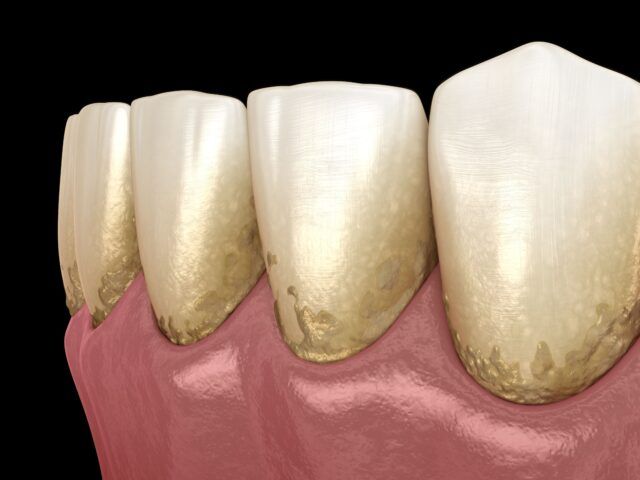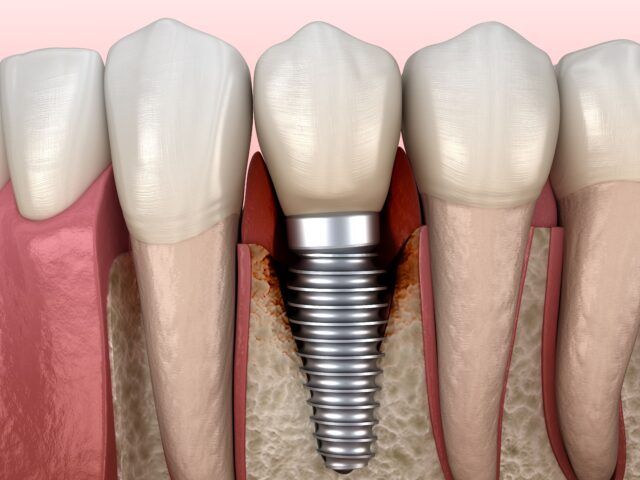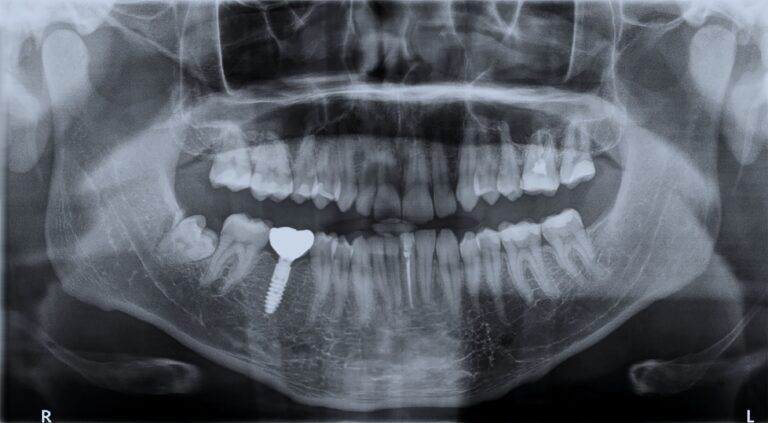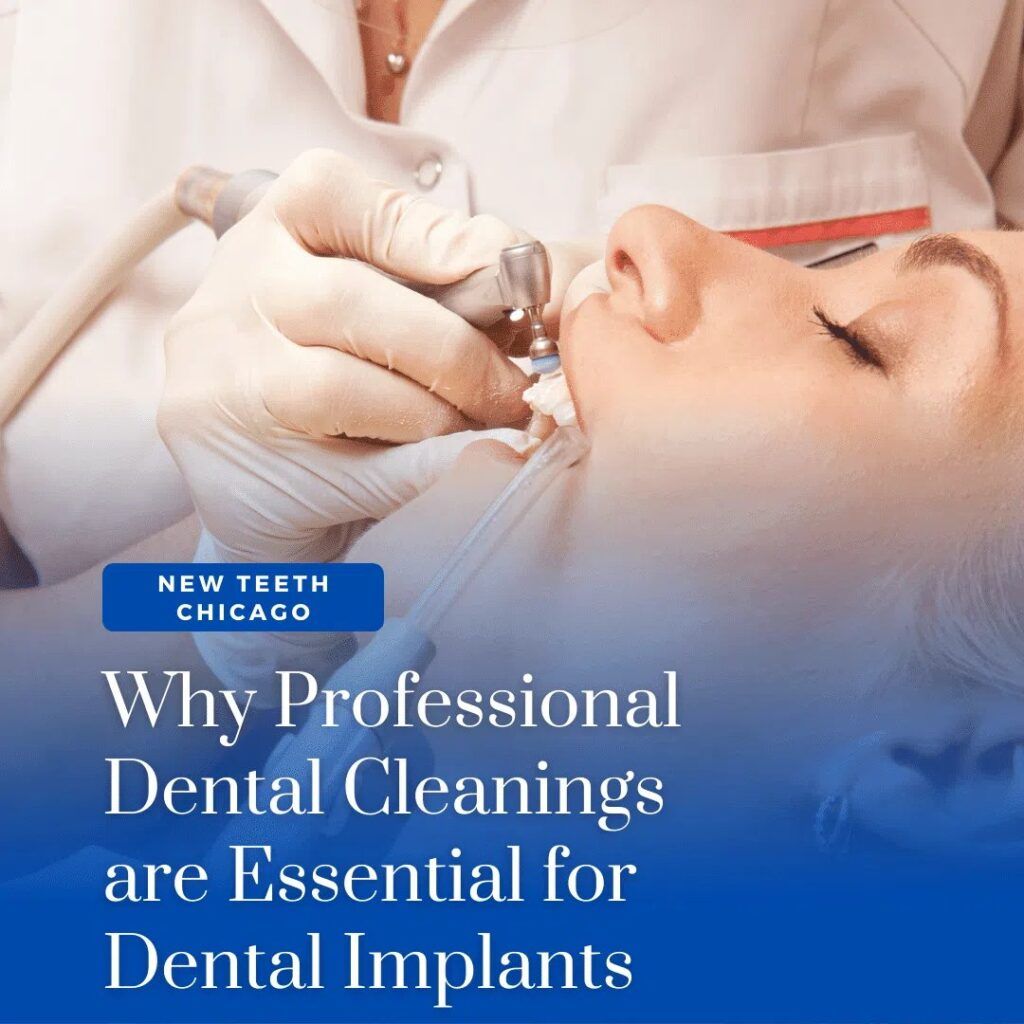Did you know that the month of October is National Dental Hygiene Month? Every year, the American Dental Hygienist Association raises awareness about the importance of dental hygiene. This year’s theme is resilience, with a focus on prioritizing individual and communal health. To help celebrate Dental Hygiene Month, we will be explaining the importance of regular dental cleanings for those who have dental implants.
I have dental implants, do I still need professional dental cleanings?
Many people may think that dental implants don’t require professional cleanings because they are not actual teeth and cannot decay. However, professional cleanings are still essential for people with dental implants. For starters, you can’t expect dental implants to work if the rest of your teeth are in poor condition. Even in cases where you have no remaining natural teeth, it is still necessary to see your implant dentist regularly for a cleaning. Why? Here are two important reasons why a regular dental cleaning regimen is essential for maintaining healthy dental implants:
Dental implants are susceptible to plaque build up just like natural teeth

Dental plaque, also known as biofilm, is a sticky film that constantly forms on the surface of the teeth. It can be clear or a pale yellow color, and is made up of saliva, food, and bacteria. Although plaque is soft and can easily be removed with regular brushing and flossing, it can harden into tartar if left undisturbed. On average, new dental plaque forms every 4-12 hours after brushing, while tartar forms after approximately 24-72 hours.
For people who have a combination of dental implants and natural teeth, the formation of excess plaque and tartar poses a threat to both their implants and natural teeth. This is because the bacteria in plaque regularly deposit an acidic waste product that erodes the enamel over time. Eventually, this will form a cavity and may result in the loss of the tooth.
Now, dental implants and their attached restorations are not able to decay due to the materials they are made from. They can, however, accumulate both plaque and tartar on their surface. The majority of the plaque will form on the crown, bridge, or denture, especially in hard to reach areas. Unfortunately, however, plaque and tartar can also form on any exposed parts of the implant screw. Removing plaque from the implant screw becomes especially problematic since the implant screw contains microgrooves that allow it to fuse with the bone. Regular dental cleanings allow your implant dentist to remove excess plaque and tartar from the implant screw and attached restoration, as well as any remaining natural teeth.
Dental implants need regular maintenance in order to stay healthy
Poor dental hygiene and an insufficient number of professional dental cleanings will lead to plaque buildup and an increased risk for gum disease. Gum disease is an inflammatory condition that occurs as a result of excess bacteria along the gum line. Severe gum disease is the leading cause of tooth loss in adults, so it’s safe to say that those who still have natural teeth are at risk of potential tooth loss.

However, those who only have dental implants can also be at risk of losing their implants. This is because excess plaque and bacteria along the gum line can cause a peri-implant disease known as peri-implant mucositis. Peri-implant mucositis is basically the equivalent of gingivitis, meaning that there is mild inflammation in the gums. However, peri-implant mucositis can easily progress into peri-implantitis, which causes jawbone deterioration around the implant screw. This can cause the implant to become loose, fall out, or fail.
Since plaque buildup can lead to peri-implant mucositis and possibly peri-implantitis, regular dental cleanings are centered on preventing this from happening by reducing the amount of bacteria in the mouth.
Dental Cleanings for Dental Implants: What to Expect
Professional cleanings for dental implants are similar to cleanings performed on natural teeth. However, there are a few key differences that you can expect. These include:
The Use of Special Tools
When having natural teeth professionally cleaned, your dentist and/or hygienist will usually use something known as a dental scaler. While dental scalers work well for removing plaque and tartar from tooth enamel, they are too hard for removing plaque from dental implants. In fact, using the wrong type of dental scaler can cause carving marks that can accumulate bacteria. For this reason, implant dentists use special tools to clean the implant. Since these tools are generally made from materials that are softer than titanium, this significantly minimizes the risk of damaging the abutment during a regular cleaning. In some cases, your implant dentist may also use interdental brushes, rubber tools, or air polishing with Glycine powder.
The Frequency of Cleanings
Another key difference between teeth cleanings and dental implant cleanings is that you may require more frequent cleanings. Traditionally, the American Dental Association recommends dental cleanings at least once every six months. With dental implants, however, your implant dentist may recommend cleanings at anywhere from 1 month to six month intervals. Generally speaking, patients with a history of gum disease and/or peri-implant mucositis will require more frequent cleanings to minimize the risk of developing peri-implantitis.
The Need for X-Rays

To make sure that the underlying bone has not been affected by bacteria, you can also expect to have x-rays taken during your dental cleaning appointment. In most cases, x-rays are taken 1 month, 2 months, 6 months, and 12 months after you have had your dental implants placed. If any changes are noted after the 12 month mark, then you may need to continue with regular x-rays. The purpose of this is to catch any potential bone problems early on so that they can be addressed.
To Sum It All Up:
It is important to schedule regular dental cleanings for dental implants because they help prevent plaque buildup and inflammation that can lead to implant failure. Professional dental cleanings will also help detect any potential bone problems early on so that they can be addressed before tooth loss occurs or the implant becomes loose, falls out, or fails. If you have had dental implants placed recently and would like more information about how regular dental cleanings may impact your oral health, feel free to contact us today.

